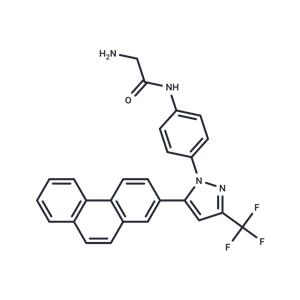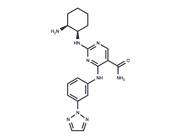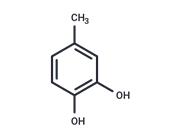| Name | Osu03012 |
| Description | Osu03012 (AR-12) is an orally bioavailable, small-molecule, celecoxib-derived inhibitor of phosphoinositide-dependent kinase-1 (PDK1) with potential antineoplastic activity. |
| Cell Research | The effect of OSU-03012 on PC-3 cell viability is assessed by using the 3-(4,5-dimethylthiazol-2-yl)-2,5-diphenyl-2H-tetrazolium bromide assay in six replicates. Cells are grown in 10% FBS- supplemented RPMI 1640 in 96-well, flat-bottomed plates for 24 hours. They are exposed to various concentrations of OSU-03012 (0-10 μM) dissolved in DMSO (final concentration ≤0.1%) in 1% serum-containing RPMI 1640 for different time intervals (~72 hours). Controls receive DMSO vehicle at a concentration equal to that in OSU-03012-treated cells. The medium is removed and replaced by 200 μL of 0.5 mg/mL 3-(4,5-dimethylthiazol-2-yl)-2,5-diphenyl-2H-tetrazolium bromide in 10% FBS-containing RPMI 1640. The cells are incubated in the CO2 incubator at 37 °C for 2 hours. Supernatants are removed from the wells, and the reduced 3-(4,5-dimethylthiazol-2-yl)-2,5-diphenyl-2H-tetrazolium bromide dye is solubilized in 200 μL DMSO per well. Absorbance at 570 nm is determined by using a plate reader.(Only for Reference) |
| Kinase Assay | PDK-1 Kinase Assay: This in vitro assay is performed using a PDK-1 kinase assay kit. This cell-free assay is based on the ability of recombinant PDK-1, in the presence of DMSO vehicle or OSU-03012, to activate its downstream serum- and glucocorticoid-regulated kinase which, in turn, phosphorylates the Akt/serum- and glucocorticoid-regulated kinase-specific peptide substrate RPRAATF with [γ-32P]ATP. The 32P-phosphorylated peptide substrate is then separated from the residual [γ-32P]-ATP by using P81 phosphocellulose paper and quantitated in a scintillation counter after three washes with 0.75% phosphoric acid. |
| In vitro | In the MDA-MB-435/LCC6 xenograft model, OSU-03012 significantly reduced the expression of EGFR protein in tumors while also inhibiting the binding of YB-1 to the EGFR promoter. In Huh7 xenografts, OSU-03012 (200 mg/kg) effectively inhibited tumor cell growth. Similarly, oral administration of OSU-03012 in the HMS-97 neurofibroma xenograft model suppressed cell growth. |
| In vivo | At concentrations of 3-5 μM, OSU-03012 can completely inhibit the growth of various tumor cells. In thyroid cancer cells (NPA, WRO, and ARO cells), OSU-03012 acts as an ATP-competitive inhibitor, inhibiting cell proliferation and migration, and inducing apoptosis by suppressing PAK activity and AKT phosphorylation. In hepatocellular carcinoma cell lines (Huh7, Hep3B, and HepG2 cells), OSU-03012 (IC50<1 μM) inhibits cell growth, notably inducing autophagy in Huh7 cells. Additionally, in glioblastoma and PC-3 cells, OSU-03012 promotes apoptosis. |
| Storage | Powder: -20°C for 3 years | In solvent: -80°C for 1 year | Shipping with blue ice. |
| Solubility Information | Ethanol : < 1 mg/mL (insoluble or slightly soluble)
H2O : < 1 mg/mL (insoluble or slightly soluble)
DMSO : 70 mg/mL (152.03 mM)
|
| Keywords | AR12 | AR 12 | Osu03012 |
| Inhibitors Related | MP7 | Rabusertib | M77976 | Polyphyllin I | Sodium dichloroacetate | RS1-PDK1 inhibitor | GSK2334470 | BX795 | Dehydroabiethylamine | Dicoumarol | PS 48 | PHT-427 |
| Related Compound Libraries | Target-Focused Phenotypic Screening Library | Bioactive Compound Library | Kinase Inhibitor Library | Antioxidant Compound Library | CNS-Penetrant Compound Library | Inhibitor Library | NO PAINS Compound Library | Anti-Aging Compound Library | Bioactive Compounds Library Max | Anti-Cancer Active Compound Library |

 United States
United States



